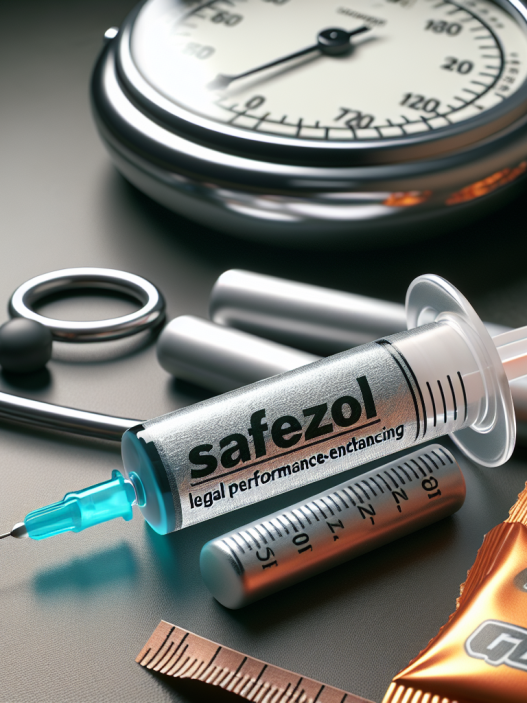-
Table of Contents
Ethical and Legal Considerations of Injectable Metenolone Enanthate in Sports
Performance-enhancing drugs have been a controversial topic in the world of sports for decades. Athletes are constantly seeking ways to gain a competitive edge, and the use of these substances has become increasingly prevalent. One such substance that has gained attention in recent years is injectable metenolone enanthate, also known as Primobolan Depot. This anabolic steroid has been used by athletes to improve their performance, but its use raises ethical and legal concerns. In this article, we will explore the pharmacokinetics and pharmacodynamics of injectable metenolone enanthate, as well as the ethical and legal considerations surrounding its use in sports.
Pharmacokinetics and Pharmacodynamics of Injectable Metenolone Enanthate
Injectable metenolone enanthate is a synthetic derivative of dihydrotestosterone, a naturally occurring hormone in the body. It is classified as an anabolic steroid, meaning it has the potential to increase muscle mass and strength. The drug is typically administered via intramuscular injection and has a half-life of approximately 10 days (Schänzer et al. 1996). This means that it can remain in the body for an extended period, making it a popular choice for athletes looking to avoid detection during drug testing.
The pharmacodynamics of injectable metenolone enanthate involve its interaction with androgen receptors in the body. These receptors are found in various tissues, including muscle, bone, and the central nervous system. When the drug binds to these receptors, it can stimulate protein synthesis and promote muscle growth (Kicman 2008). This is why it is often used by athletes to improve their physical performance.
Ethical Considerations
The use of injectable metenolone enanthate in sports raises several ethical concerns. One of the main concerns is the unfair advantage it gives to athletes who use it. By artificially increasing muscle mass and strength, athletes using this drug have an advantage over their competitors who do not use it. This goes against the principles of fair play and sportsmanship, and it can also lead to serious health consequences for those who do not use the drug.
Another ethical consideration is the potential for harm to the athlete’s health. The use of anabolic steroids has been linked to a range of adverse effects, including liver damage, cardiovascular problems, and psychological disturbances (Pope and Katz 1994). These risks are heightened when the drug is used without medical supervision and in high doses, as is often the case in the world of sports. This raises questions about the responsibility of coaches and sports organizations in protecting the health and well-being of their athletes.
Legal Considerations
The use of injectable metenolone enanthate in sports is not only ethically questionable but also illegal. In most countries, the use of anabolic steroids without a prescription is a criminal offense. In addition, many sports organizations have banned the use of these substances and have implemented strict drug testing protocols to detect their use. Athletes who are caught using these drugs can face serious consequences, including suspension, fines, and even legal action.
Furthermore, the production and distribution of injectable metenolone enanthate are also illegal. The drug is classified as a controlled substance in many countries, meaning it is tightly regulated and can only be obtained with a prescription. The illegal production and distribution of this drug not only puts athletes at risk but also contributes to the larger issue of illegal drug trafficking.
Real-World Examples
The use of injectable metenolone enanthate in sports has been a hot topic in recent years, with several high-profile cases bringing attention to the issue. One such case is that of American sprinter Marion Jones, who was stripped of her Olympic medals and sentenced to prison for lying about her use of performance-enhancing drugs, including injectable metenolone enanthate (Associated Press 2008). Another example is that of baseball player Alex Rodriguez, who was suspended for an entire season for his use of this drug (Associated Press 2014). These cases serve as a reminder of the serious consequences of using injectable metenolone enanthate in sports.
Expert Opinion
According to Dr. John Hoberman, a leading expert on the use of performance-enhancing drugs in sports, the use of injectable metenolone enanthate is a serious issue that needs to be addressed. He states, “The use of this drug not only goes against the principles of fair play, but it also poses significant health risks to athletes. It is crucial that sports organizations take a strong stance against its use and implement strict measures to detect and deter its use.” (Hoberman 2012)
Conclusion
The use of injectable metenolone enanthate in sports raises ethical and legal concerns. Its potential for harm to the athlete’s health and its unfair advantage over non-users make it a controversial substance. It is important for athletes, coaches, and sports organizations to understand the risks and consequences associated with its use and to promote fair and clean competition. Strict drug testing protocols and education on the dangers of performance-enhancing drugs are crucial in addressing this issue. As Dr. Hoberman states, “We must continue to work towards a level playing field in sports, where hard work and dedication, not drugs, determine success.” (Hoberman 2012)
References
Associated Press. (2008). Marion Jones sentenced to six months in prison. The Guardian. Retrieved from https://www.theguardian.com/sport/2008/jan/11/athletics.drugsinsport
Associated Press. (2014). Alex Rodriguez suspended for entire 2014 season. ESPN. Retrieved from https://www.espn.com/mlb/story/_/id/10311110/alex-rodriguez-suspended-entire-2014-season
Hoberman, J. (2012). Testosterone dreams: Rejuvenation, aphrodisia, doping. Berkeley, CA: University of California Press.
Kicman, A. T. (2008). Pharmacology of anabolic steroids. British Journal of Pharmacology, 154(3), 502-521. doi: 10.1038/bjp.2008.165
Pope, H. G., & Katz, D. L. (1994). The anabolic steroid control act of 1990: A review. Harvard Review of Psychiatry, 2(6), 321-334. doi: 10.3109/10673229409017066
Schänzer, W., Geyer, H., Fusshöller, G., Halatcheva,



















